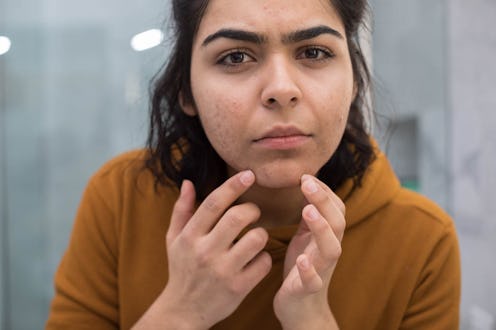Style
Adult Acne Can Be Painful, So Here's How To Treat Those Uncomfortable Breakouts

Acne is a condition which is so associated with teenage skin, many of us often forget that it can affect men and women of all ages. I myself have have breakouts of mild adult acne from time to time, and I'm 26. But what causes adult acne?
Paula's Choice founder Paula Begoun tells me: "The largest group affected by acne is teenagers. But just because you’re out of your teen years or escaped them without a blemish, it doesn’t mean acne can’t or won’t happen later in life. Many adults deal with acne in their teens and decades beyond."
Begoun goes on to explain that one of the main factors that causes adult acne is hormones. "People with oily skin are at a greater likelihood of developing acne because, in most cases, excess oil is a contributing factor — and oil production is controlled by hormones. Some women experience acne concurrent with their monthly cycle or the onset of menopause, all due to shifting hormones."
Other hormonal changes such as medication, contraception, and pregnancy can also trigger breakouts of acne, according to Begoun. Meanwhile Gazelli Skin expert Valerija Lifanova also confirms that stress and diet can affect the skin too.
Of course, acne is nothing to feel ashamed of. Everyone breaks out in spots from time to time, including celebrities. In fact, Bella Thorne recently spoke out about her skin issues and has called for everyone to start embracing their acne. She told Us Magazine: "I got this pimple the other day and I said to my sister, 'Look at this! I have a press day coming up!' And she said, 'That's a beautiful pimple, Bella. That is beautiful. Scars are beautiful.
"We both struggle with acne, but now, every time we get something on our face, we just to each other, 'That's beautiful. I love my scars. I love my skin.' You have to change your mindset."
However, while it's important to embrace your skin, acne can sometimes be painful and uncomfortable. So, if you do want to treat it, here's how.
Skincare regimes
The most important thing I have learnt while dealing with my own skincare issues is the importance of keeping a skincare regime consistent. I once interviewed Dr. Barbara Sturm and without me even revealing anything to her, she could tell the spots around my chin and jawline were down to over-using too many different products. The best advice I can give personally to anyone suffering from acne is to find a skincare regime that works for you and stick to it. Throwing in a bunch of different things will just confuse and complicate, rather than solve.
So what kind of products should you be using? Dr. Dennis Gross emphasises the importance of effective cleansing to remove dirt, excess oil, and grease. "One of the biggest mistakes women make is not properly cleansing and removing makeup before bed," he tells me. "You should always remove all make-up from the face before going to bed at night to avoid breakouts."
He recommends using products targeted at treating spots: "To treat acne most effectively yet gently, start out by using over-the-counter anti-acne remedies that contain either exfoliating, pore-clearing salicylic acid or bacteria-banishing benzoyl peroxide."
Ensure you do not overpower skin, however. Super strong acids may irritate acne more than it helps. I would recommend finding a gentle salicylic cleanser (the Tata Harper Regenerating Cleanser is great), then following this with a light serum and gel-cream daily, adding in light AHA formulas and targeted spot treatments as and when. Sometimes it's best to keep things simple to let skin clear up.
Diet
While there is little evidence fast food and the like directly causes acne, keeping skin hydrated with lots of water and water-rich foods is always a good idea. Vegetables such as cucumber and watermelon are rich in water.
Skin that is dehydrated often over-compensates by over-producing oil, leading to breakouts. Nutritionist Rhiannon Lambert also revealed to The Telegraph that foods such as salmon (and other fatty fish), avocado and walnuts are great for skin also, due to the vitamins and oils they contain.
Light therapy
This treatment uses different coloured lights (usually blue and red) to kill bacteria on skin that causes inflammation. You can go pro as Millie Mackintosh did (plenty of clinics now do it, as well as brands such as Cowshed) and there are also a number of brands that now offer at-home devices, such as Foreo and Neutrogena.
Prescription medication
If none of the above make much of a difference, taking a trip to see your doctor to discuss your options is the best idea.
While only reserved for extreme cases, GPs can prescribe medications such as retinoids or antibiotics to try and treat acne. Lifanova suggests having your hormone levels checked while at the GP, too.